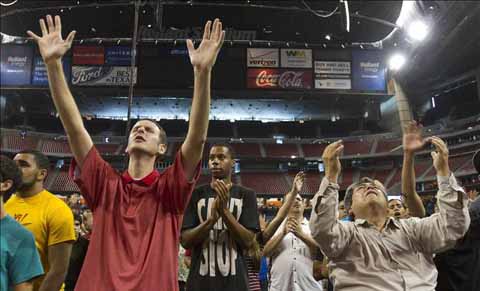One day, Jesus turned to one of His most faithful disciples, fisherman Simon Bar-Jonah, and gave him a new name. God had only done that a few times before – Abram to Abraham, Sarai to Sarah, Jacob to Israel, then a few years later, Saul to Paul. In Matthew 16:18, Jesus not only re-named Simon, but told him: “I tell you, you are Peter, and on this rock I will build my church, and the gates of hell shall not prevail against it.”

“This was an extraordinary thing for Jesus to do,” writes Christian attorney John Salza, “because ‘rock’ was not even a name in Jesus’ time. Jesus did this, not to give Simon a strange name, but to identify his new status among the apostles. When God changes a person’s name, He changes their status.” Indeed, Peter would have a unique role in founding the church.
“The Gospel records that He built one church and that all saved people were in that church,” writes David Pratt. “He prayed for unity and rebuked division.” In 1 Corinthians 1:10, the Apostle Paul pleaded “let there be no divisions among you!”
So, how did today’s church get so divided – Catholics, Baptists, Methodists, Lutherans, Presbyterians, Pentecostals, Mennonites, Orthodox, Mormons, to list just a few?
 “Today, hundreds of denominations exist in the name of Christianity,” notes Pratt, “claiming to be Christian. They are divided and contradict one another.” Sometimes their theological differences are puzzling. In order to receive eternal salvation, Southern Baptists believe we must hear the Gospel, believe Jesus is Lord, confess that belief before others and repent of our sins, then we must be baptized. The Churches of Christ/Christian Churches teach exactly the same thing – except for the sequence: salvation only comes after the final step, after baptism. Then the Southern Baptists believe a Christian cannot lose his salvation; the Churches of Christ disagree – a believer can “backslide” and end up in Hell just like anybody else.
“Today, hundreds of denominations exist in the name of Christianity,” notes Pratt, “claiming to be Christian. They are divided and contradict one another.” Sometimes their theological differences are puzzling. In order to receive eternal salvation, Southern Baptists believe we must hear the Gospel, believe Jesus is Lord, confess that belief before others and repent of our sins, then we must be baptized. The Churches of Christ/Christian Churches teach exactly the same thing – except for the sequence: salvation only comes after the final step, after baptism. Then the Southern Baptists believe a Christian cannot lose his salvation; the Churches of Christ disagree – a believer can “backslide” and end up in Hell just like anybody else.
 Both groups base their theology on the Bible. Some of their differences are incredibly minor – yet keep large groups of believers from having much to do with one another. For example, the Churches of God headquartered in Anderson, Indiana, is theologically almost identical to the Churches of Christ/Christian Churches – however the latter refuse to recognize any central headquarters.
Both groups base their theology on the Bible. Some of their differences are incredibly minor – yet keep large groups of believers from having much to do with one another. For example, the Churches of God headquartered in Anderson, Indiana, is theologically almost identical to the Churches of Christ/Christian Churches – however the latter refuse to recognize any central headquarters.
Many Pentecostals believe much as the Baptists and the Anderson Churches of God do – except teach that salvation comes only after the in-filling of the Holy Spirit, which the convert must prove by vocalizing a heavenly language, “speaking in tongues.”
 Another enormous divide concerns how God’s gift of eternal salvation is given. On one side are those who believe salvation must be gained, even earned, by fulfilling certain obligations. Others disdain such obligations, saying salvation is freely given by God’s boundless grace and all we have to do is accept His gift.
Another enormous divide concerns how God’s gift of eternal salvation is given. On one side are those who believe salvation must be gained, even earned, by fulfilling certain obligations. Others disdain such obligations, saying salvation is freely given by God’s boundless grace and all we have to do is accept His gift.
The headquarters issue is a major sticking point among many groups. Millions of Christians in China are required by their government to repudiate any headquarters other than the government-recognized Three-Self Movement for non-Catholics and the national Catholic Association, both with headquarters in Beijing.
 Worldwide, the largest group of Christians, the Roman Catholic Church is headquartered in Vatican City – right in the middle of Rome, Italy – and disdains any notion that they are a denomination. Everybody else is, they teach. They, on the other hand, are the original church. However, the Christian Churches/Churches of Christ also teach that – insisting they are “non-denominational,” while everybody else is “denominational.”
Worldwide, the largest group of Christians, the Roman Catholic Church is headquartered in Vatican City – right in the middle of Rome, Italy – and disdains any notion that they are a denomination. Everybody else is, they teach. They, on the other hand, are the original church. However, the Christian Churches/Churches of Christ also teach that – insisting they are “non-denominational,” while everybody else is “denominational.”
 Greek, Ethiopian, Syrian, Bulgarian, Ukrainian, Russian and other Orthodox groups are divided largely over the headquarters issue. To outsiders, they don’t seem that different from each other or Roman Catholics – however, most are rich in rituals and traditions that have developed over the centuries and which are held dear by the faithful.
Greek, Ethiopian, Syrian, Bulgarian, Ukrainian, Russian and other Orthodox groups are divided largely over the headquarters issue. To outsiders, they don’t seem that different from each other or Roman Catholics – however, most are rich in rituals and traditions that have developed over the centuries and which are held dear by the faithful.
Mormons, a large and growing group, have their headquarters in Salt Lake City, and believe that their founder in the 1800s was visited by an angel who lead him to a manuscript of the Book of Mormon, which the church teaches is “another Gospel of Jesus Christ” – but is not accepted by any other group. Similarly, the Jehovah’s Witnesses, Christian Scientists and Seventh-Day Adventists have their own individual headquarters and their own unique teachings passed down by their founders, but rarely accepted by anybody else.
 So, is all this division a good thing?
So, is all this division a good thing?
“To the average person,” teaches Pratt, “Christianity includes hundreds of different denominations that disagree with one another in name, organization, doctrine, worship, and plan of salvation. Such a situation clearly constitutes division, not unity. Yet all the denominations claim to be Christian and to follow Jesus Christ. If we really want to please God, however, we must forsake what we want and practice what He wants.”
 After all, Ecclesiastes 12:13 teaches us that man’s whole duty is to fear God and keep His commands. We should be determined to do God’s will, not our own. Matthew 16:24 instructs us that to follow Jesus we must deny ourselves. “True religion does not consist of what pleases us,” says Pratt. “It is entirely a question of what pleases God.
After all, Ecclesiastes 12:13 teaches us that man’s whole duty is to fear God and keep His commands. We should be determined to do God’s will, not our own. Matthew 16:24 instructs us that to follow Jesus we must deny ourselves. “True religion does not consist of what pleases us,” says Pratt. “It is entirely a question of what pleases God.
“The fundamental consequence of denominationalism is that error is just as good as truth! If the denominational concept is true, then all denominations are acceptable to God even though they flatly contradict one another regarding worship, salvation, etc. This means error is just as good as truth and unrighteousness is just as good as righteousness. Denominationalism must be wrong because it says that error does not condemn.”
 Pratt, of course, has a clear idea of what he believes to be the true church. And it does not include groups that are “in error.” Pastor Rick Harrington isn’t so sure. He says the issue can be viewed in terms of “The Good, the Bad, and the Ugly.”
Pratt, of course, has a clear idea of what he believes to be the true church. And it does not include groups that are “in error.” Pastor Rick Harrington isn’t so sure. He says the issue can be viewed in terms of “The Good, the Bad, and the Ugly.”
“The Good: Denominations help people distinguish theological differences. If I am looking for a church that holds to Scripture alone as the highest authority, then I certainly want to stick to a protestant denomination. If I am also looking for one that holds to believer’s baptism, then I want to find a free church or a baptist church. If I want one that is paedo-baptist (infant baptism) I will look to the Presbyterian, Methodist, or Congregationalist. If I am Reformed, then usually that means Presbyterian or Congregational. If I want a high-church liturgy, then Anglican or Methodist. You get the idea. Denominations mean we are taking theology seriously. That is a good thing. To water down the message for the sake of unity is a huge mistake.
 “The Bad: Denominations can also be bad. By that I mean evil. They can be a source of divisiveness and arrogance. When one denomination begins to think that they are the only real Christians who have a full grasp on all the truth, there is a problem. I’ve seen this in all different denominations. Christ is bigger than any one denomination of Christianity. Sectarianism and divisiveness are flat out evil. This falls into the ‘I follow Paul’ or ‘I follow Apollos’ mentality we read about in 1 Corinthians.
“The Bad: Denominations can also be bad. By that I mean evil. They can be a source of divisiveness and arrogance. When one denomination begins to think that they are the only real Christians who have a full grasp on all the truth, there is a problem. I’ve seen this in all different denominations. Christ is bigger than any one denomination of Christianity. Sectarianism and divisiveness are flat out evil. This falls into the ‘I follow Paul’ or ‘I follow Apollos’ mentality we read about in 1 Corinthians.
“The Ugly: Sometimes denominations can just be plain ugly. People hide away in their denominational traditions and never peek out to see what else is going on in the world. It is not that people don’t think there can be Christians outside of their denominations, it’s just that they have no association with them. They are ‘American Baptists’ or ‘Southern Baptists’ or ‘Orthodox Presbyterian’ or ‘Evangelical Presbyterian Church.’ Think about how this looks to the world. Instead of making much of our unity in Christ, we turn the church into alphabet soup: ABC, SBC, BGC, EPC, OPC, PCA, UCC, CCCC, PCUSA, UMC, CB, ELCA, IFCA, etc. (yes those are all real denominations).
 “Can we save the good, and get rid of the bad and the ugly? Can we do away with the bad and the ugly, and still keep the good? Only in degrees. We can get better and better. How about a more radical idea?” suggests Harrington. “Be inter-denominational. Be a church that majors on the essentials, is not afraid to talk about and deal with the non-essentials but doesn’t divide over them. Welcome folks to join based on the gospel essentials, but still maintain strong theological differences without dividing over them.
“Can we save the good, and get rid of the bad and the ugly? Can we do away with the bad and the ugly, and still keep the good? Only in degrees. We can get better and better. How about a more radical idea?” suggests Harrington. “Be inter-denominational. Be a church that majors on the essentials, is not afraid to talk about and deal with the non-essentials but doesn’t divide over them. Welcome folks to join based on the gospel essentials, but still maintain strong theological differences without dividing over them.
“That’s what we are trying at First Baptist. We are a Gospel-centered, believer’s Baptist, complementarian church in practice. However, we have a good handful of paedo-baptists. I’m what would be a labeled a five-point Calvinist, but I would be happy to welcome an Arminian into fellowship and debate. We are covenantal for the most part, yet open to dispensationals at all levels of leadership. We major on the essentials.”
 Hardliners would say he has embraced apostasy. Others would say he’s trying to overcome human barriers and be obedient to the command in I Corinthians to shun all the divisions.
Hardliners would say he has embraced apostasy. Others would say he’s trying to overcome human barriers and be obedient to the command in I Corinthians to shun all the divisions.
A recent conference on the future of evangelicalism raised some interesting questions about denominations. Blogger Trevin Wax tried to keep up with the discussion for his readers. “At the core of the issue of denominationalism is a simple question: is it a good or bad thing that the Christian church is split into so many different denoninations?
“Answering that question requires addressing many other issues as well, such as how a denomination might help or hinder individual churches’ ministries, and how members of different denominations should (or should not) work with each other,” reports Wax.
He puts forth an interesting reason that denominations can be useful: they bring balance to individual churches’ tendency to “over-specialize” in just one area of ministry.
“Evangelical churches in general tend to specialize in, unsurprisingly, evangelism,” he writes. “Narrow definitions and limited experiences do not stretch us into the people that Jesus came to make us into. Even though we are all called at different points to different specialties (gifts, ministries, vocations – insert your word here) in the church, God has also called us to be first His in ALL aspects of life. We need to experience others who are specialists in aspects that we have, but may not concentrate on. We need their perspective, and we need to learn form them.
“Is your church part of a denomination, and if so, has that association been a help or a hindrance to its ministry? Share your thoughts!” he asked readers.
“I have maintained for a very long time that denominations equate to traditions,” answered reader Howard Gunter. “When a tradition and its accompanying practices become MORE important to the following than basic Bible doctrines, that denomination becomes a constraint rather than a blessing. I especially adhere to the point that specializing in a single or few practices derived from Scripture may rob the following of a full teaching of the Christian life as set before us by the ONE EXAMPLE: Jesus the Christ and in some cases encourage an attitude of eliteness. Another thing that emerges in some “specialized” practices is a forced or choreographed response which only tends to serve man and allows for personal pride.
“There are positives as well to traditions. The most glaring is that it provides a certain structure and comfort for a following and certainly order. I simply believe that we need to be open to guidance and leading of the Holy Spirit, without any sense of trepidation when something occurs that falls out of the realm of “tradition” as long as there is NO conflict with basic bible doctrine. I am well aware that various denominations interpret the doctrines differently and therein lies the draw to followers that seek a personal comfort zone in which to worship.”
“In my experience, the tricky thing about denominations is the same as political parties,” responded reader Dale Fincher. “If you don’t toe the party line you’re at great risk. There leaves little room for growth into new developments of theology and understanding. If one is merely a member of a church, he may feel that his larger denomination overlooks local needs. If you are on paid staff, you may find your career and financial support disappearing if you are convinced by conscience and study that the dogmatism of your particular denomination isn’t accurate. And this silences many preachers because it’s better to keep quiet than to not put food on the table.
“Something often overlooked is the more nebulous question of what it means for Jesus to be the ‘head’ of the church and for the Holy Spirit to bring unity. Seems, in practice, we sidestep these two and impose hierarchy to “replicate” the work God promised to do among local assemblies.
“That’s not to say denominations are ‘bad’ per se. They’ve done many great things. And when they go well, they have more strength, resources, and voices than mere local assemblies. But when they go bad, they can be devastating, silencing strength, resources, and voices of local assemblies.”
“When you look at the New Testament,” answered reader Morris Saffold Jones, “there is no justification for such a thing. In fact, the way church is practiced in America could be described as ‘a waste of time.’ The first century church got together and actually fellowshipped. Coming together today (for church) is a joke in that people drive to a massive building, drop 10 percent of their income in a bucket, listen to someone espouse their opinion for 45 minutes (without ANY dialogue – which means that many people have not engaged), then scramble through a throng of people to pick up their kids and go home to the same lives that they left 3 hours prior.
“In the first century, the ekklesia or the assembly was small, local, and lacked the destructive culture that we have today. they actually sat around a perimeter and debated the scriptures. Imagine that! thinking about the scriptures in front of other believers. Do we believe the Bible or do we believe in structure?”

“’Denomination’ is not in the Holy Bible,” observed reader Ira Kirkpatrick, “and is like a two edged sword. It brings people together and separates them as well. There were seven churches of Asia because of different cities and all were followers of Jesus Christ and that is what we need more than denominations. We do not need to be traditionalist to the determent of the spirit of the lord and its function in us.
“When we get to heaven there will not be Baptist, Catholic, Protestant, Jewish, Pentecostal or any other. I have seen all my life the divisions of denomination cause more problems than it solved in my opinion. We must read and study the Bible for what it states and not what we want it to say.
 “I am Christian first and when asked what religion I am, I say I am a Christian and follower of Christ. Blessed is the Lord Jesus Christ who did for our sins.
“I am Christian first and when asked what religion I am, I say I am a Christian and follower of Christ. Blessed is the Lord Jesus Christ who did for our sins.
“God so loved the world that he did not send a committee, or a denomination.”
So, what do you think?





